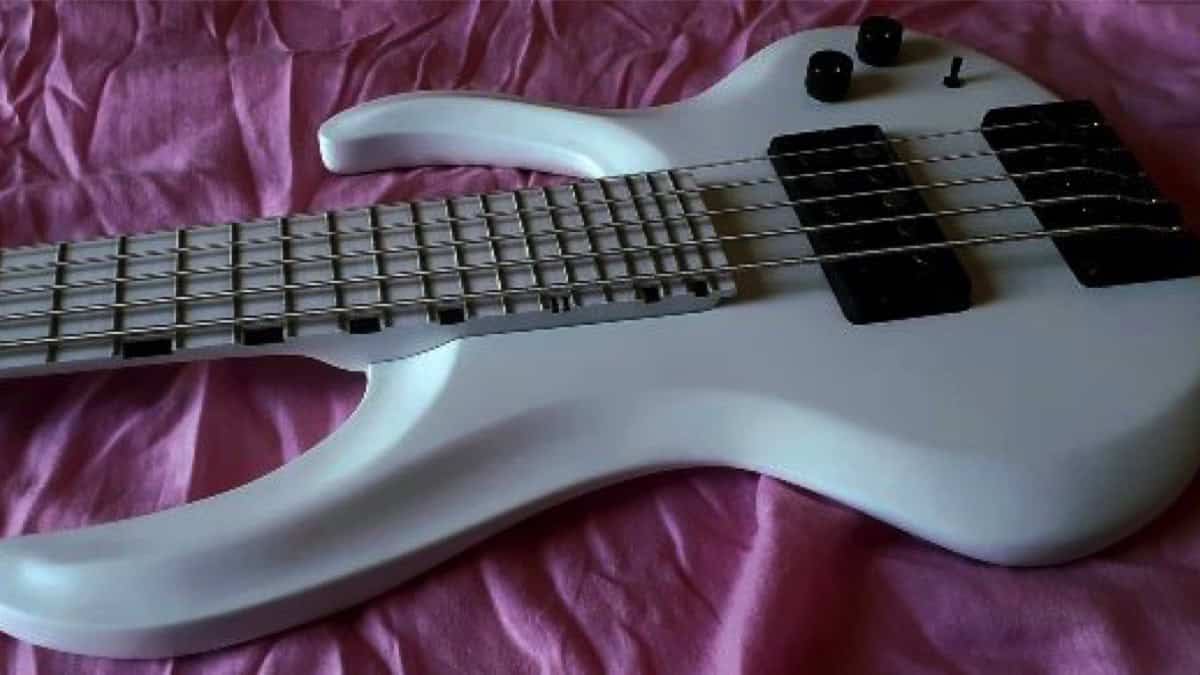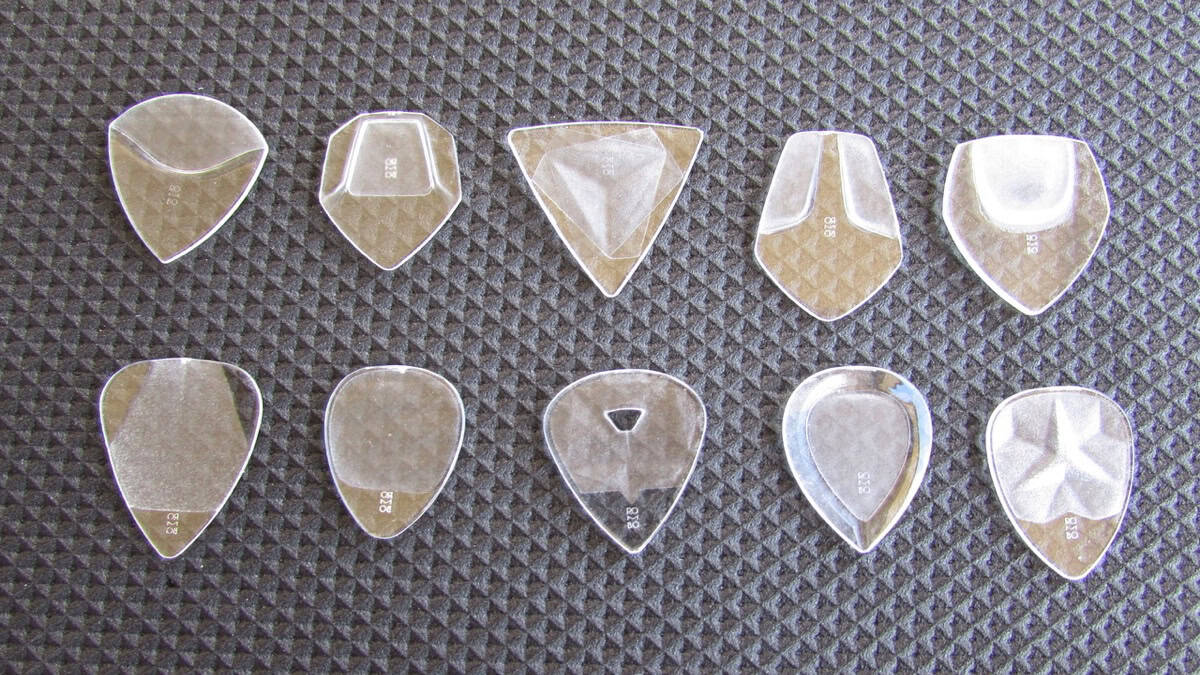Latest
Development of Technique and Its’ Right of Use Helps Expression and Musicality by Yiorgos Fakanas

I would like before anything else to express my true joy at being able through the pages of the hospitable Bass Musician Magazine to communicate with friends and colleague’s, and in particular bass players, and exchange experiences, ideas, and concerns about our strong mutual creative passion.
Coming from Greece, a European country evolving from an ancient civilization and with substantial musical activity today, I have experientially developed a particular mode of analysis and thought on my musical involvement with Jazz, Fusion, and their “offspring’s”, which in my opinion constitute international musical streams, and a universal language of expression and communication. I will try, through this electronic column to convey my thoughts and my view on all those issues which concern our music, and which of course have as their main protagonist, the bass.
I have been a professional bass player, composer, arranger, and teacher of our instrument, as well as Jazz theory for over thirty years. In all that time, I’ve had the opportunity to reap some exceptional experiences and knowledge, and to collaborate with some of the best musicians in the world. And as a teacher, I have followed my new bass students’ concerns and anxieties. As a result of my educational role, I among other things have accumulated a whole list of issues that concern the younger players as well as some professional bass players, issues that relate entirely to music. But I’ve also experienced greater issues as well, more philosophical, artistic, and work-related issues for the new as well as the accredited musician.
A prevailing issue is the need for and the degree of the development of technical dexterity for the bass-player, and to what extent this affects their musicality and expressiveness.
Technique is an enormous issue with any instrument, and there are many conflicting views on its use and utility. I could say that it has its proponents, and opponents. I will try in the following lines to briefly present my own view, knowing that it is impossible to exhaust such a wide topic in a few words. I will simply expose some of the main opposing arguments on the usefulness of technique in today’s musical reality in creative music, merely as a starting point for further discussion and exchange of views between us.
Let’s define, initially, what we mean by “technique” for any musical instrument. It is the totality of actions performed by a musician to adjust their muscular system, at its highest level, in order to carry out the necessary movements required by their instrument, so as to produce the desired result for the performance of simple or intricate compositions. In other words, the versatility and speed of the hands with respect to the musical material at hand determines the extent of technique necessary for the musician, and bassist.
Technique and its development constitute in my opinion the basic determining factor for the potential of each musician for expression. I cannot imagine how a musician without any technique, and whose relation to his instrument is not characterized by any form of dexterity, can aspire, through his instrument and music, to express their sonic experiences, their spiritual mood, and the communicative exchange he or she wants to form between themselves and their audience. Because what differentiates a musician from other people is that he or she creates through the ability to communicate via a musical instrument!
How unrealistic then are the claims, especially by younger musicians, that the development of technique opposes musicality, that it limits freedom of expression by imposing particular paths and forms tried in the past yet restrictive for the progression of new ideas. I believe the exact opposite. Expression alone means nothing for an artist unless they control the technical means of their art. Of course the impulse of the young, who want to acquire years of knowledge and experience as quickly as possible trying to instantly surpass the old and replace it with their own, adopts this type of view about the more scholastic involvement with the musical object. Time is needed, as well as determination and patience, to develop an expressive means to a high level. But it’s a necessary process if we want to play whatever we choose with ease and persuasiveness, and express our mind, heart, and spirit. It is inconceivable for a musician not to know music, and for a performer of a musical instrument not to grasp its technical secrets. It is essential to know the whole in order to be able to use that part of it that inspiration calls for each time, or that the musical work we are called to interpret requires.
However, I do not support the use of technique, for no reason other than exhibition, not serving the essence. Naturally, a musician needs to be able to play intricate melodic, harmonic, and rhythmic patterns, assuming they know each time what and why they are doing it, and not just to show-case the abilities of their hands. Today, a number of bass players use techniques like slapping and tapping merely to impress their audience, without this being obligated by some deeper expressive need. There, and whenever such phenomena occur, we have a misuse of technique. Not because the dense and intense bass line devitalizes the composition, but because in essence it is not called for by the piece itself.
Naturally, I am not suggesting that everything should be simplified so as not to burden the message to the audience. I adore intricate music and intricate bass patterns, as long as their presence is a natural consequence of the work, and not disconnected from it. Intricacy in expression does not invalidate the austerity of a musical work if it is necessitated by the work itself, and accompanied by having knowledge of the use of the mediums.
Conclusion: It is all good, and desirable for today’s bass player to develop his or her technical resourcefulness to the fullest, as long as they are aware that this is a means to an end, the end being inspired expression and a deeper musicality. We should also be reminded for the sake of the argument that the knowledge and progress of technique has never interfered with eloquence in expression. On the contrary, it has helped it shine whenever used with the aim of a high musical outcome.
Yiorgos Fakanas
Gear News
New Gear: Alberto Rigoni Signature Bass, the VPR5 by Gaetano Costanzo!

Alberto Rigoni Signature Bass, the VPR5 by Gaetano Costanzo!
Internationally renowned bassist ALBERTO RIGONI (soloist, BAD AS, Vivaldi Metal Project, TwinSpirits, etc.) is proud to announce the release of his signature bass VPR5 made by renowned Italian luthier Gaetano Costanzo!
The bass is entirely handmade in Italy, without the use of CNC or other machinery, and has rather special features. The VPR is a 5-string bass (but also available as a 4-string) with 30 frets, Seymour Duncan pickups, Music Man Alnico style, passive electronics (volume, tone and a switch to select series/parallel/single-coil mode), alder body, and American maple neck and fingerboard. Gotoh tuners that ensure perfect intonation. The bass is totally painted white (nitro finish) but other colors can be requested. The VPR has a weight of about 2.9 kg and suitable for any genre.
For more information contact Gaetanobass77@gmail.com or visit online at www.instagram.com/gaetanocostanzoluthier or www.facebook.com/GaetanoCostanzoLuthier
Bass Videos
Interview With Bassist Graham Stanush

Bassist Graham Stanush…
Return to Dust is keeping Grunge alive and well! They have a new self-titled album that went out on May 3rd, 2024 and will be super busy promoting this project in the near future.
Graham Stanush is the bass powerhouse driving their sound and adding vocals to the mix. Join me as we hear all about Graham’s musical journey, details about the new album, how he gets his sound and their plans for the future.
Featured Videos:
Visit Online:
linktr.ee/returntodust
instagram.com/returntodustband/
twitter.com/Returntodustbnd
youtube.com/@returntodustband
tiktok.com/@returntodustband
Bass Videos
Review: CrystalBright Rombo Picks

CrystalBright Rombo Picks
PR SamplePlaying bass with a pick is still a touchy subject in our community. I believe you should be able to use whatever you need to get your sound. Even though I mostly play with my fingers, I like to check out innovative new picks that might have something new to offer, sonically speaking.
Judith and Carlos from Rombo recently contacted me about a new material called CrystalBright that they have been researching for the last 12 months and offered to send some prototype picks. After trying them out, I put together this video with my findings.
For more info check out @rombopicks
Latest
This Week’s Top 10 Basses on Instagram

Check out our top 10 favorite basses on Instagram this week…
Click to follow Bass Musician on Instagram @bassmusicianmag
FEATURED @sireusaofficial @ricardosguitars @gullone.bajos @godin_guitars @sandbergguitars @adamovicbasses @bassbros.uk @baumguitars @harleybentonofficial @dingwallguitars
Gear
New Joe Dart Bass From Sterling By Music Man

Sterling by Music Man introduces the Joe Dart Artist Series Bass (“Joe Dart”), named after and designed in collaboration with the celebrated Vulfpeck bassist.
Above photo credit: JORDAN THIBEAUX
This highly-anticipated model marks the debut of the Dart bass in the Sterling by Music Man lineup, paying homage to the Ernie Ball Music Man original that all funk players know and love. The bass embodies many of the original model’s distinctive features, from its iconic minimalist design to the passive electronics.

The design process prioritized reliability, playability, and accessibility at the forefront. Constructed from the timeless Sterling body, the Dart features a slightly smaller neck profile, offering a clean tone within a comfortable package. The body is crafted from soft maple wood for clarity and warmth while the natural finish emphasizes the simple yet unique look.
Engineered for straightforward performance, this passive bass features a ceramic humbucking bridge pickup and a single ‘toaster’ knob for volume control. Reliable with a classic tone, it’s perfect for playing in the pocket. The Dart is strung with the all-new Ernie Ball Stainless Steel Flatwound Electric Bass Strings for the smoothest feel and a mellow sound.

The Sterling by Music Man Joe Dart Bass is a special “Timed Edition” release, exclusively available for order on the Sterling by Music Man website for just one month. Each bass is made to order, with the window closing on May 31st and shipping starting in November. A dedicated countdown timer will indicate the remaining time for purchase on the product page. Additionally, the back of the headstock will be marked with a “2024 Crop” stamp to commemorate the harvest year for this special, one-of-a-kind release.
The Joe Dart Bass is priced at $399.99 (MAP) and can be ordered globally at https://sterlingbymusicman.com/products/joe-dart.
To learn more about Joe Dart, visit the official Vulfpeck artist site here https://www.vulfpeck.com/.










